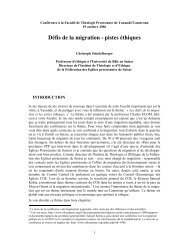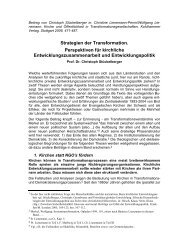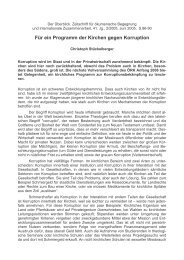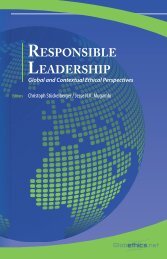BREAK THE CHAINS OF OPPRESION AND THE YOKE OF ...
BREAK THE CHAINS OF OPPRESION AND THE YOKE OF ...
BREAK THE CHAINS OF OPPRESION AND THE YOKE OF ...
Create successful ePaper yourself
Turn your PDF publications into a flip-book with our unique Google optimized e-Paper software.
Ethics two? Globethics.net proposes the following understanding for dialogues on<br />
values2 :<br />
“Global ethics is an inclusive approach towards common binding values, guiding<br />
principles, personal attitudes and common action across cultures, religions,<br />
political and economic systems and ideologies. Global ethics is grounded in the<br />
ethical recognition of inalienable human dignity, of freedom of decision, of personal<br />
and social responsibility and of justice. Global ethics acknowledges the interdependence<br />
of all human and non-human beings and extends the basic moral<br />
attitudes of care and compassion to our world. Global ethics identifies transboundary<br />
problems and contributes to their solution.<br />
Global ethics fosters public awareness of those fundamental values and principles.<br />
They are the foundation on which the universal consensus on human rights<br />
is built. Human rights are the most tangible and legally binding expression of<br />
this ethical vision. Global ethics fosters trust among human beings and strengthens<br />
caring and action for global environmental protection.<br />
Contextual ethics takes seriously the identity of persons and institutions in their<br />
local, cultural, religious, economic and political contexts. Global ethics needs to<br />
be local and contextual in order to have an impact on individual action and societal<br />
structures. On the other hand, contextual ethics becomes isolationist if it<br />
remains local and is not linked to global ethics.<br />
Contextual ethics appreciates and respects diversity in its different forms as social,<br />
political, cultural, religious, and bio-diversity. There is an enormous richness<br />
in diversity. It may decrease vulnerability and be a source of sustainability.<br />
Contextual ethics contributes to global ethics. Together they can lead to unity in<br />
diversity. All cultures and religions can contribute to global values. For example,<br />
the contribution �of African � values � to global values � includes � that all of reality is a<br />
continuum, from the spiritual to the human to fauna, flora, and the inanimate<br />
world. Therefore, injuring nature is unethical. This implies responsibilities towards<br />
non-human living beings and the inanimate universe as well as the continuum<br />
between generations that have gone before and that come after us.<br />
Global and contextual ethics are two poles which challenge each other and inseparably<br />
belong together.<br />
Global and contextual ethics have to consider power structures. Global ethics<br />
can be abused for domination over other cultures, religions and values. Contextual<br />
ethics can be abused to defend traditional privileges or power. On global as<br />
well as on local level, ‘power over others’ tends to be oppressive, ‘power with and<br />
for others’ tends to be empowering and nurturing. Power as ‘power from’ (e.g.<br />
2 The following chapter, mainly written by the author, is quoted from Globethics.net<br />
Principles on Sharing Values across Cultures and Religions, published by Globethics.net,<br />
Geneva 2009. www.globethics.net.<br />
������������������������������������������������<br />
� � � � ����������������������� �<br />
82<br />
– CLIMATE JUSTICE <strong>AND</strong> TAX JUSTICE –










